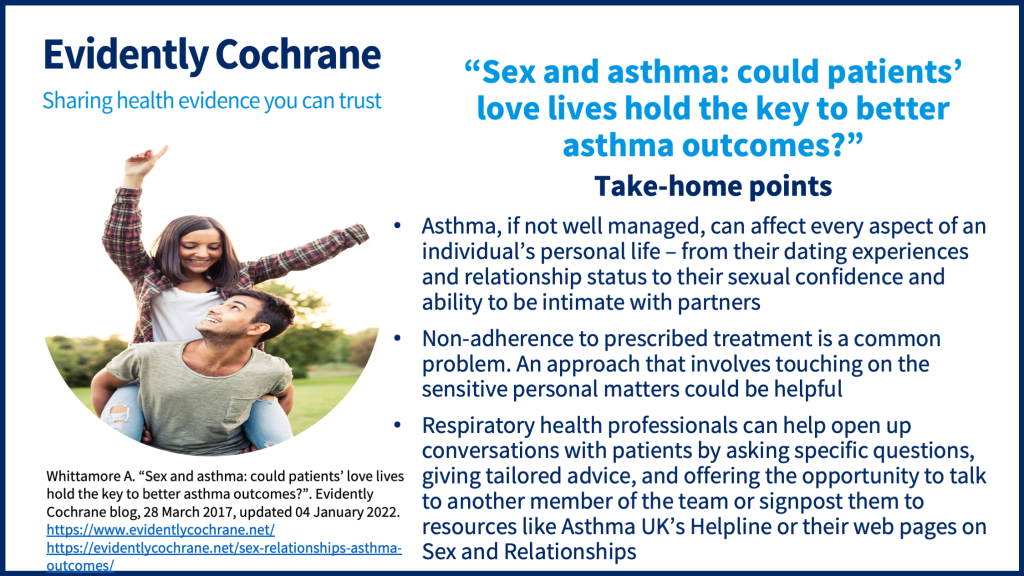In this blog on sex and asthma for respiratory healthcare professionals, Asthma UK’s in-house GP Dr Andy Whittamore explores how encouraging patients to talk about their love lives could result in better asthma self-care and flags the need for more ‘people-shaped’ research.
Page updated 04 January 2022 and last checked 30 January 2023.
Take-home points

We know that 5.4 million people in the UK have asthma,[1] and that non-adherence to prescribed treatmentSomething done with the aim of improving health or relieving suffering. For example, medicines, surgery, psychological and physical therapies, diet and exercise changes. is a common problem among these patients – preventing them from getting the most from their medicines and increasing their riskA way of expressing the chance of an event taking place, expressed as the number of events divided by the total number of observations or people. It can be stated as ‘the chance of falling were one in four’ (1/4 = 25%). This measure is good no matter the incidence of events i.e. common or infrequent. of a potentially life-threatening asthma attack.[2] In fact, research shows less than 50% of people with asthma (both adults and children) don’t achieve full adherence when using Inhaled Corticosteriods (ICS),[3] while nearly 33% never take their prescribed medicines.[4]
Putting it bluntly, regardless of how much you tell your asthma patients to take their medicines as prescribed, many won’t. This signals the need for a radically different approach, one that involves touching on the sensitive personal matters that could be the key to helping people take their asthma – and their medicines – more seriously. Thinking bigger, what if engaging in these conversations could open neglected research avenues that could be delaying the discovery of better treatments, and ultimately, a cure?
Sex talk can trigger asthma talk
In a recent Asthma UK health activation campaign, we brought to attention the impact of asthma on sex and relationships. In our ‘Asthma and Your Love Life’ survey over two-thirds (68%) of people told us their asthma gets in the way of their sex life, while almost half (46%) said they’d be more sexually confident if they didn’t have asthma. Furthermore, 73% of respondents said they felt embarrassed about using their inhaler on a date, and over half said they’ve cringed about wheezing during a romantic night out.[5]
The overarching message of this campaign is that asthma, if not well managed, can affect every aspect of an individual’s personal life – from their dating experiences and relationship status to their sexual confidence and ability to be intimate with partners. In our ‘Asthma and Your Love Life’ survey respondents shared their deepest fears about dating and having sex with asthma – with concerns ranging from not being able to enjoy long kisses without getting symptoms, to having a full-blown asthma attack after an orgasm.
This has enabled us to trigger a conversation around asthma that focuses on the importance of self-care and taking medicines as prescribed. It’s provided a platform to remind people with asthma that if they’re struggling with symptoms such as wheezing and coughing it may mean their asthma isn’t as well controlled as it could be – and that for the majority, it is possible to enjoy fulfilling, symptom-free love lives, while reducing the risk of an asthma attack.
Motivating asthma patients to tackle their ‘silent misery’
The evidence continues to pile up in support of self-management as the most effective way to reduce both loss of control and use of healthcare services. The next question, then, is how do we encourage people to self-manage? This paper suggests that effective self-management should be tailored to cultural, clinical and demographic characteristics and is most effective when delivered in the context of proactive long-term condition management.
A shocking 15% of respondents felt their asthma contributed to a previous relationship failing (read Callie Anne’s moving insight into the strain asthma can put on a relationship here). Truly personalised care must take into account the impact of asthma on relationships and the lack of discussion around sex and relationships that currently means silent misery for many. Opening conversations up to sex and romance, and how asthma could be getting in the way, could encourage your patients to reconsider their self-care and feel more empowered to get their asthma under control.
Three suggestions for tackling the taboo with your patients
- Ask specific questions about particular aspects of people’s lives: “Do you notice your asthma when you are at work/at school/when you are doing exercise?”, “what do you tell your partner about your asthma?”, “how does your asthma affect your love life?” and “for some people, activities like sex can cause asthma symptoms – how about you?”
- Give tailored advice: “does your partner know what to do if you had an asthma attack?”, “I hope you take your reliever inhaler with you when going on a date”, “have you warned your partner that flowers/scented candles/latex causes you difficulties?”
- It’s quite possible someone won’t want to open up – explain that they can talk to another member of your team if they prefer, or signpost them to Asthma UK’s sex and relationship advice or the Asthma UK helpline where our nurses can provide confidential advice.
Plugging the ‘people-shaped’ gaps in asthma research
Asthma UK is funding numerous research projects to help us better understand, and ultimately cure, asthma. We involve people affected by asthma at all stages of our research programme: from telling us what the priorities for research should be to help shape our research strategy, to selecting which research applications made to us should be funded, to guiding researchers in external projects. But without more effective ways of supporting self-management and adherence, new drugs will only ever be part of the solution.
Sparking conversations around intimate personal issues like sex and relationships is one way to get under the skin of non-adherence and could pave the way for more relevant and meaningful studies and product development pathways to improve self-care and quality of life in asthma patients.
Not only that, but by engaging with them on a deeper level and moving away from traditional approaches, we can truly involve people with asthma in both their own care and the development of new asthma treatments and cures. By working together with patients to understand their lives holistically – including confronting taboo issues like sex – we have the opportunity to tackle the issue of non-adherence in new ways.
Asthma UK supports people with asthma when they need us most through our online health advice and helpline.
Andrew Whittamore reports that he is paid by Asthma UK for 2 days per week as their Clinical Lead and that both he and Asthma UK have received funding from a variety of sources though none are relevant to the submission of this article. This article was commissioned from Asthma UK as a result of a survey they created and published.
References can be found here
All the blogs in our series on sexual problems can be found in the blog The problem with sex: a taboo that’s harming patients?
Please note, we cannot give specific medical advice and do not publish comments that link to individual pages requesting donations or to commercial sites, or appear to endorse commercial products. We welcome diverse views and encourage discussion but we ask that comments are respectful and reserve the right to not publish any we consider offensive. Cochrane UK does not fact check – or endorse – readers’ comments, including any treatments mentioned.


